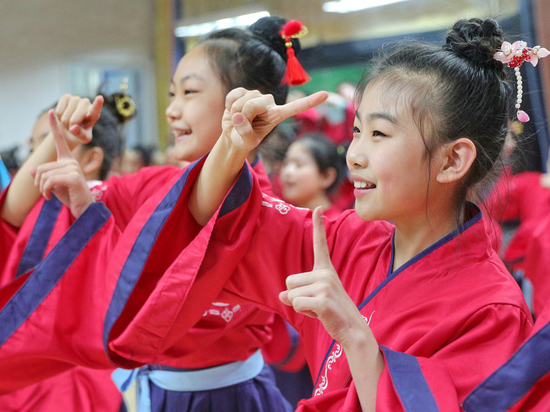Ganbei, kuni, chifanki: linguist named Chinese words that penetrated the Russian language
[ad_1]

Less than a day has passed since the state reception in honor of Xi Jinping in the Kremlin, and all of Russia already knows how to say “to the bottom!” in Chinese. The “ganbei” toast, pronounced by Vladimir Putin in honor of the distinguished guest, has every chance now to enter the folk feast. And in general, it would not hurt to dilute the Russian speech, swollen with borrowings from the English language, with a couple of sonorous phrases from Chinese, – linguists are sure.
Moreover, the citizens of the Celestial Empire have been singing Russian songs in karaoke for more than a decade, and in the Russian language of words – immigrants from Chinese can be counted on the fingers of one hand.
Today, in the Russian language, words that came from Chinese are real rarities. If you do not take philosophical terms (tao, yin-yang, feng shui) and the names of dog breeds (shih tzu, shar pei), how many rooted in the Russian language can you count? The famous lexicographer Max Vasmer in his Etymological Dictionary of the Russian Language found only eight words that came to us from Chinese. True, that was before World War II.
At first glance, this is strange, because relations between Russia and China are more than one hundred years old.
– The first ambassadors to China from Russia left more than 400 years ago. But the capitals, St. Petersburg and Moscow, have always been closer to Europe purely territorially. Therefore, there was no particular activity in the dissemination of Chinese words, – explains the linguist, translator from Chinese Nikolai Voropaev.
But if you come to the Far East, you can certainly hear a lot of things, from which the eyes of the ignorant will climb on their foreheads. But there is no need to be frightened and blush with embarrassment: these are just Chinese words adapted to our speech.
– For example, the word “chifan” came from Chinese to the Far Eastern mixed dialects. Literally, it translates as “to eat, to eat.” As a result, it was transformed into “chifan”. “Let’s go chifan” – “let’s go eat.” Even cafes called “chifanka” have appeared in the Far East, – says the expert.
Girls who decide to go on a trip to the Far East should not be furious if the locals call them “kunya” there. This is from the Chinese “gunyang” – translated as “girl”.
Some words from Chinese have become so firmly established in the Russian language that few people even remember where they came from.
For example, “ketchup” is not Anglicism at all, even if the word itself is associated with an advertisement for American sauce. “Ketchup” is a word of Chinese origin, and it originally meant fish sauce.
Even from Chinese, “pearl”, “pollock”, “tea” came to us. And not only “oolong”, but also “long” – in the sense of the word. From the Chinese “baihua” it is translated as “white hair”. The word “book” also originates in Chinese.
Did the Chinese take any Russian words for themselves? Linguist Nikolai Voropaev says yes. There are few such words, but a curious story is connected with them.
– In the 19th century, Chinese agricultural producers began to come to work in the Trans-Baikal Territory. In these regions of the Russian Empire, they still did not know how to grow zucchini, cucumbers and tomatoes. And the Chinese have already learned this a long time ago and have been actively working in Russia. It was then that they took the Russian words “bread”, “bucket” and “dress” into their language. Until now, in Harbin and the northern regions of China, you can hear these words. Of course, the Chinese pronounce them in their own way due to the peculiarities of phonetics, – says Nikolai Voropaev.
And the inhabitants of the Middle Kingdom are very fond of Russian songs and sing them in every karaoke.
– I counted more than 120 Russian songs that are loved and sung in China. One of my favorites is Troika Postal. Of course, everyone sings Katyusha, including state orchestras. The Chinese also hold in high esteem “And who knows”, “There are so many golden lights”, “Beautiful far away”, “If there was no winter” from the cartoon “Prostokvashino” and “Horse” of the Lube group. Chinese poets are actively translating Russian songs into Chinese – this is a very important element of cultural exchange.
By the way, linguists gave useful advice to lovers of the feast. If the Chinese hospitable hosts, pouring another glass of intoxicant to the guest, chant “ganbei!” (“to the bottom!”), and you don’t want to go overboard with alcohol, – in response, say a toast “bugan!” (“not to the bottom!”). The hosts will understand that the guest is “in the know”, and the guest will be more likely to sit out until the end of the dinner party or dinner in a more or less sober state.
How do you say it in Chinese?
Hello! [nǐ hǎo] Nihao!
Goodbye! [zài jiàn] Zaijien!
Welcome! [huānyíng] Huanying!
Thank you! [xiè xie] Sese!
Please!![bù kě qi] [bùyòngxiè]Bukhatsy! Buyunse!
You are very beautiful! [nǐ hěn piàoliang] Ni hen pyaoliang!
I love you! [wǒ ài nǐ] Wow
Friend (péngyǒu) Peng yu/
Newspaper headline:
How to respond to “ganbei”?
[ad_2]
Source link








